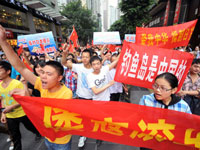Global business leaders are voicing increasing concern over heightened political tensions between China and Japan, sparked by a maritime dispute in the East China Sea. They fear an escalation may have a spill-over effect on their regional operations and damage trade ties between the world’s second and third-largest economies.
 |
|
AFP | Getty Images
|
Company executives, diplomats and analysts told CNBC that supply chains across China and Japan and regional trade flows are at risk if theterritorial dispute between the north Asian neighbors – believed to be the worst in decades – deepens.
“This could really be something that causes a huge economic dislocation,” Mike Splinter, chief executive officer at Applied Materials told CNBC. “If import barriers go up, it could affect our business.”
John Rice, president and CEO at GE Global Growth and Operations said he was worried about the potential “repercussions” to the flow of free trade that may arise because of escalating “geo-political” risk in the region. “That’s what we worry about…because we’re free traders to our core.” Rice said he was monitoring developments “very closely.”
While the precise scale of any disruption to manufacturing supply chains is hard to assess, many observers are starting to draw a parallel with the disruption in the wake of the 2011 Fukushima disaster in Japan.
“Everyone is taking their cue from last year’s earthquake and tsunami in Japan…no one expected what the damage would be,” said Stephen Bosworth, dean of The Fletcher School of Law and Diplomacy at Tufts University, and former U.S. Ambassador to South Korea between 1997 and 2001. “All these things have consequences. This is probably the most tightly integrated region in the world in terms of trade and investment.”
Martin Jacques, author of ‘When China Rules the World: the End of the Western World and the Birth of a New Global Order’, added: “There are so many companies tied into the production chain, that this could have wider dislocation effects. We saw this with the earthquake and tsunami in Japan in 2011.”
Politics Trumps Economics
In the immediate term, Japanese companies operating in China have borne the brunt of a backlash after Japan bought the disputed islands, called Senkaku in Japan and Diaoyu in China, earlier this month, sparking anti-Japan protests across China.

